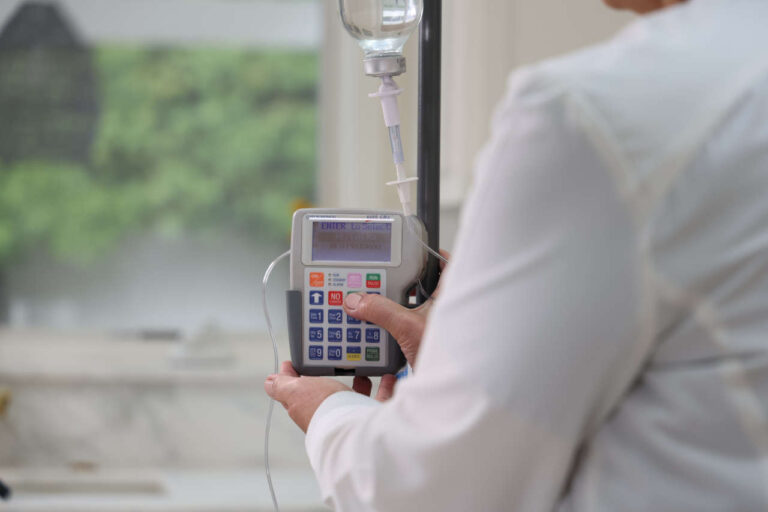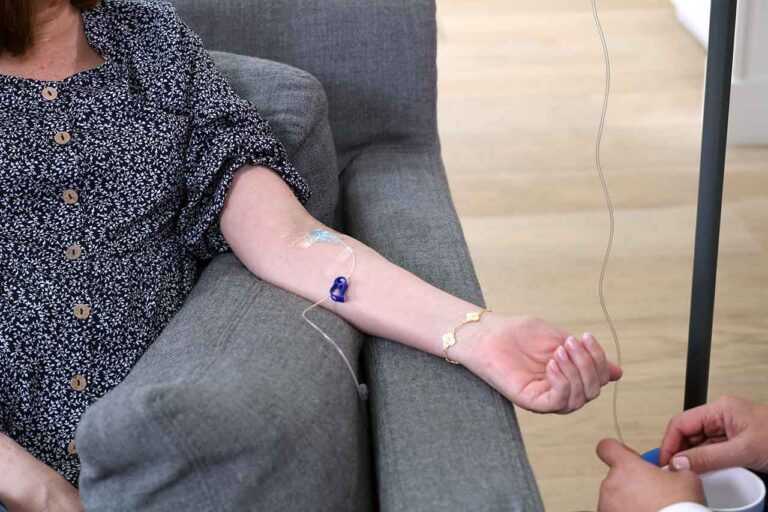
IVIG, also known as intravenous immunoglobulin, is a drug therapy that contains a mixture of concentrated human-derived الأجسام المضادة. It is used for a variety of conditions, including autoimmune disorders and immune deficiencies in which the body doesn’t produce sufficient healthy antibodies or destroys its own antibodies. Furthermore, IVIG serves as a stimulant for the immune response, empowering the body to combat foreign substances effectively and boosting its innate immune capabilities. This versatile intervention extends its benefits to individuals of all ages, encompassing both the pediatric and adult populations.
هل يمكن أن يساعد IVIG؟
معلومات مجانية عن علاج IVIGWith its inherent anti-inflammatory properties, IVIG assumes a pivotal role in addressing a range of autoimmune inflammatory conditions. Among these, ailments such as مرض كاواساكي, vasculitis, dermatomyositis, and chronic bowel disease find therapeutic relief through IVIG administration. This article will explain how IVIG serves as an effective tool in mitigating the symptoms associated with inflammatory bowel disease (IBD).
What Is Inflammatory Bowel Disease (IBD) and Its Symptoms?
Inflammatory bowel disease (IBD) is a persistent inflammation of the gastrointestinal tract (GIT). IBD refers to two diseases: ulcerative colitis and Crohn’s disease.
Ulcerative colitis is the inflammation of the colon (the inner lining of our large intestine) believed to be caused by abnormal reactions of the immune system. However, other factors apart from immune effects may cause ulcerative colitis including genetic factors and environmental triggers like stress, depression, smoking, and medication use.
Some of the common symptoms of ulcerative colitis include:
- ألم في البطن
- Blood in stool
- إسهال
- القيء
- حمى
- فقدان الوزن
Crohn’s disease is another inflammatory autoimmune disease of the gastrointestinal tract, affecting different areas of the GIT from the stomach to the anus. The body’s normal response to any illness or damage, including autoimmune illnesses, is inflammation. In Crohn’s disease, the body’s immune system attacks the healthy cells, which triggers inflammation, causing ulcers and swelling in the gastrointestinal tract.
The symptoms of Crohn’s disease include:
- Severe diarrhea
- ألم في البطن
- تعب
- Malnutrition
- فقدان الوزن
- Blood in stool
- Reduced appetite
- حمى
IVIG and Inflammatory Bowel Disease: How IVIG Helps Manage Symptoms
IVIG is often utilized in individuals who have not responded to other traditional treatments for severe inflammatory bowel disease, such as Crohn’s disease or ulcerative colitis. Around 10% to 20% of people with inflammatory bowel disease do not respond to primary treatments, and in these cases, immunoglobulin therapy may be required. IVIG helps manage the symptoms of IBD by the following mechanisms:
تعديل المناعة
In addition to helping to modify immune responses and prevent the immune system from attacking healthy cells, IVIG also contains a variety of healthy concentrated human-derived antibodies, which reduces gastrointestinal tract inflammation.
Cytokine Regulation
Cytokines are signaling molecules secreted by the immune cells and are involved in controlling inflammation. IVIG may also have an impact on the creation, activity, and amount of cytokines, which aids in the improvement of the immune system and the reduction of inflammation.
Anti-Inflammatory Properties
Intravenous immunoglobulin (IVIG) comprises a mixture of antibodies, encompassing IgG, IgA, and IgM, which possess anti-inflammatory attributes and regulate the immune response against inflammation. By diminishing inflammation, IVIG assists in mitigating the symptoms of inflammatory bowel disease (IBD) such as diarrhea, fever, abdominal pain, and fatigue.
تحدث إلى أحد المتخصصين
حول مساعدة الدفع المشتركRegulating Immune Cells
As IVIG stimulates the immune system using a range of beneficial antibodies, it also regulates the functions of various immune cells like dendritic cells, T cells, and B cells. This dual action assists in diminishing the release of pro-inflammatory cytokines while promoting the secretion and production of anti-inflammatory cytokines.
Mucosal Healing
IVIG aids in mucosal healing and boosts the immune system, enhancing the overall health of the gastrointestinal tract.
Studies on IVIG and Inflammatory Bowel Disease
Patients with inflammatory bowel disease may be ineligible for traditional pharmacological therapy, or they may acquire tolerance to some IBD drugs after prolonged use. In such cases, alternative therapies, like intravenous immunoglobulin may be given for short-term treatment.
Research investigated the effects of IVIG on patients with IBD, and showed that IVIG is safe and effective for the short-term treatment of IBD in patients who are contraindicated to standard treatments.
Anti-inflammatory medications, biologic therapy, such as anti-TNFa (anti-tumor necrosis factor-alpha), and immunosuppressants are common treatments for inflammatory bowel disease. IVIG reduces the negative effects of these medications in patients who are intolerant to them and provides a different treatment option with a different safety profile.
Patients with inflammatory bowel disease should also make dietary modifications in addition to taking medication. These changes should include eating cold foods and avoiding meals that are particularly hot and other items that increase stool production, such as coffee, prunes, and fresh fruits and vegetables. Depending on the patient’s health, the usual IVIG dosages might range from 400 to 800 mg/kg every 4 weeks (per month).
The Ideal Candidate for IVIG Treatment
IVIG is not a first-line or primary treatment option for IBD. The use of IVIG may be ideal for the following candidates:
- Patients with one or more autoimmune disorders or immune deficiencies in addition to inflammatory bowel disease.
- Candidates whose autoimmune diseases are not well-managed with other conventional treatments.
- Patients who do not respond to or tolerate anti-inflammatory drugs.
Which Patients With Inflammatory Bowel Disease Should Not Take IVIG?
IVIG is commonly contraindicated in the following patients with inflammatory bowel disease:
- Patients who are intolerant to fructose.
- Patients who had a negative reaction history to immunoglobulin or IVIG.
- Patients who have recently taken live vaccines, like measles or mumps.
Side Effects Of IVIG

The common side effects of IVIG يشمل:
- Muscle aches
- Flu
- غثيان
- حمى
- التنظيف
These side effects commonly occur during the first 2 days of infusion, but if they persist or become severe, consult your doctor immediately.
معلومات العلاج
احصل على موافقة مسبقة لـ IVIGRisks of IVIG
Because of the inherent risks and complications of IVIG, its use becomes particularly desirable in more severe cases, where other mechanisms of action have been shown to be inadequate in managing the complications of inflammatory bowel disease (IBD). The potential risks of IBD include:
- Infusion reactions
- ردود الفعل التحسسية
- Renal dysfunction
- Thrombotic effects
To reduce the potential risks associated with IVIG, a vigilant approach is essential. This involves closely monitoring symptoms such as swelling, pain, or bleeding, as well as conducting thorough assessments of renal functions. This oversight is critical both during and after the administration of IVIG. While IVIG is generally deemed safe during pregnancy and breastfeeding, it is necessary to engage in an informed discussion with your healthcare provider. It is important to share details about your medical history, drug usage, and condition before starting immunoglobulin therapy.













